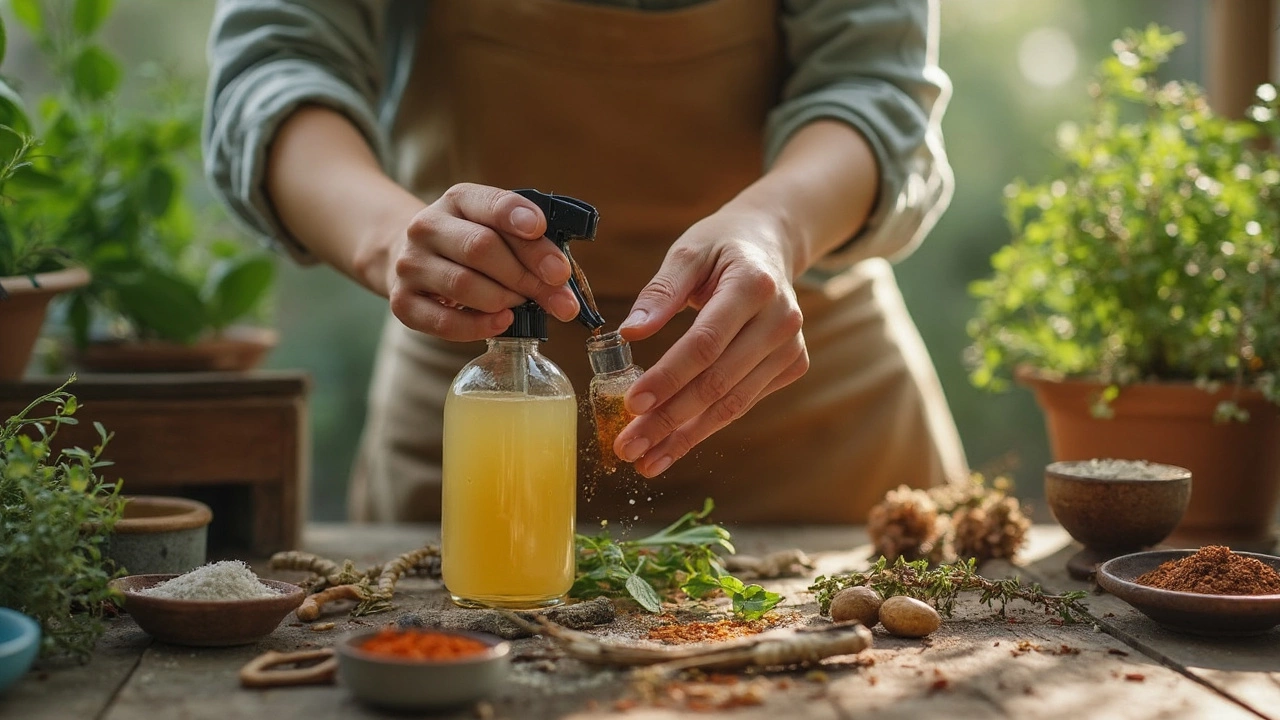Why resort to harsh chemicals when Mother Nature has gifted us with countless natural methods to keep pests away from our gardens? Imagine using simple ingredients, many of which are probably lounging around your kitchen, to protect your veggie patches and flower beds. It’s not just a greener way to tackle pests; it’s also a much safer option for you, your plants, and the environment.
Think about vinegar. This common household item does wonders beyond making salads zesty. It acts as a powerful deterrent for ants and even some other annoying bugs. Mix it with some water, and you’ve got yourself a spray that’ll have the bugs thinking twice before setting up camp. There's a whole world of natural solutions waiting to transform your pest control game.
- Understanding Natural Pest Killers
- Common Ingredients in Natural Solutions
- DIY Pest Control Recipes
- Plants That Repel Pests
- Benefits of Natural Pest Control
- Safety Tips for You and the Environment
Understanding Natural Pest Killers
When it comes to keeping your garden free of uninvited guests, natural pest killers are your best pals. But what exactly are these eco-friendly options all about? Essentially, they’re methods or substances that deter or eliminate pests without relying on synthetic chemicals. This means you’re not just protecting your garden but also reducing your carbon footprint.
Ever thought about why the use of natural pest control is gaining momentum? It's not just about going green. It's often cheaper and easy to whip up with stuff you already have at home. Plus, it doesn’t hurt that these solutions can be just as effective, if not more so, when it comes to certain common pests.
For instance, essential oils like peppermint and neem oil have been shown to keep pesky insects like aphids and beetles at bay. They’re part of a broad category of organic pest solutions that offer targeted pest control without collateral damage to beneficial insects like bees and ladybugs.
Let's geek out for a second with a bit of data:
| Pest | Natural Solution | Effectiveness |
|---|---|---|
| Aphids | Peppermint oil | High |
| Ants | Vinegar | Moderate |
| Caterpillars | Neem oil | High |
This table gives you a peek into how specific natural ingredients work against certain pests, showcasing their effectiveness. Using such targeted solutions helps keep your garden lush and thriving.
By embracing eco-friendly pest management, you're not only doing a favor for your garden but also for the planet. So next time you're eyeing a spray bottle, think about grabbing some natural alternatives instead!
Common Ingredients in Natural Solutions
Swapping out chemical concoctions for natural pest killers might seem like a big leap, but it’s simpler than you think. Let’s talk about some common ingredients that make natural pest killers so effective.
Vinegar tops the list here. Its strong smell and acidity work like magic to repel ants, fruit flies, and even some types of weeds. Just mix vinegar with water and douse the problem areas.
Next up, we have essential oils, particularly peppermint and eucalyptus oils. These oils not only smell fantastic to us but are downright offensive to various pests like mosquitoes and spiders. A few drops mixed with water can act as a natural deterrent.
Another champion ingredient is garlic. Its pungent aroma wards off a variety of insects. Crush some cloves, soak them in water, and you’ve got yourself an all-natural insecticide.
Don't forget about baking soda. It's not just for the kitchen or for heartburn relief. When mixed with sugar, it can attract and then eliminate pesky cockroaches.
If you’re battling slugs, try coffee grounds. Besides being a great fertilizer, the caffeine in the coffee helps keep these slimy invaders at bay.
Here's a quick look at how these ingredients stack up:
| Ingredient | Best For |
|---|---|
| Vinegar | Ants, fruit flies, weeds |
| Essential oils | Mosquitoes, spiders |
| Garlic | General insect repellent |
| Baking soda | Cockroaches |
| Coffee grounds | Slugs |
Using these natural solutions, you can tackle pests in a way that’s effective and friendly to the planet. Plus, most of these items are probably already in your kitchen, making it cost-effective too!
DIY Pest Control Recipes
Want to kick pests out of your garden without resorting to chemicals? You're in luck, because there are some simple natural pest killers you can whip up right at home. These DIY solutions are not only effective but also budget-friendly.
Let's start with a classic: the garlic spray. It’s not just vampires that hate garlic; many pests do too. Here's how you can make it:
- Mince one whole bulb of garlic.
- Mix the minced garlic with two cups of water.
- Let it steep overnight.
- Strain the mixture to remove garlic bits.
- Add two more cups of water and a teaspoon of dish soap.
- Pour it into a spray bottle and you’re ready to go!
This mix works wonders on all sorts of pests like aphids and cabbage worms.
Another effective solution uses one of your pantry favorites: vinegar. To make it, just follow these steps:
- Combine one part vinegar with three parts water.
- Add a few drops of dish soap to make it stickier.
- Shake it up and spray directly on unwanted guests.
This eco-friendly pest management hack is particularly good for dealing with ants and fruit flies.
If you’re battling slugs or snails, try beer. Turns out, these slimy trespassers aren’t just a nuisance; they also have a taste for the frothy stuff. Fill a shallow dish with beer and place it near the affected plants. It’s a quick way to reduce their numbers.
And let’s not forget essential oils like peppermint and neem oil. Mix about ten drops of your chosen oil with two cups of water, and spray around your garden to see pests disappear.
These organic pest solutions not only save your plants but also ensure you’re not introducing harmful chemicals into the ecosystem.

Plants That Repel Pests
Ever thought your garden could handle its own pest control? Some plants naturally fend off creepy crawlies, sparing you from dealing with unwanted guests. Not only will these green friends add charm to your space, but they'll also play double duty in keeping pests at bay.
Marigolds are one of the most beloved plants for pest control. These sunny blooms don’t just brighten your garden; they have a distinct smell that repels nematodes and whiteflies. Plus, they attract beneficial insects like ladybugs, who love to snack on aphids.
If mosquitoes are the bane of your barbecue, try planting citronella. Yes, that’s right—the same stuff used in those mosquito-repellent candles. Having this plant in your garden creates a natural barrier against these biting nuisances.
For those dealing with slugs, nothing works quite like mint. Its strong aroma confuses and deters these slimy invaders while adding a refreshing scent to the garden. Be mindful, though, as mint can take over if not kept in check.
Another trusty ally is lavender. Not only calming to us, but its scent also puzzles moths, fleas, and flies. Planting lavender near your doors or windows provides a welcoming fragrance while uninviting bugs.
Here's a quick look at these natural pest warriors:
| Plant | Repels |
|---|---|
| Marigolds | Nematodes, Whiteflies |
| Citronella | Mosquitoes |
| Mint | Slugs |
| Lavender | Moths, Fleas, Flies |
Choosing the right plants can make a big difference in your pest control efforts. So next time you’re planning out your garden, consider introducing these natural repellents. It's an easy and eco-friendly way to keep those pests in check!
Benefits of Natural Pest Control
Choosing natural pest killers for your garden isn't just a trendy move; it comes with some solid perks that make everyone, from seasoned gardeners to newbies, give it a thumbs up. First off, you’re dodging those nasty chemicals. Using chemical pesticides might zap the pests, but they also leave behind residues that can harm the environment and even sneak into our food.
Another biggie? It’s super safe for kids and pets that think your garden is their playground. You won’t have to worry about Fluffy getting sick or the kiddos having a reaction. Plus, these eco-friendly options won't harm beneficial bugs like bees and ladybugs that your garden actually needs to thrive. So, it’s like protecting your garden’s tiny superheroes while evicting the villains.
Then, there's the cost. A lot of eco-friendly pest management tricks bring your grocery list into play. Who knew items like garlic, vinegar, and soap could double as garden defenders? This not only shrinks your pest control budget but also cuts down on trips to the garden store. Let's not forget the minimal impact on the planet. By sticking with nature's own solutions, you’re reducing pollution and supporting a healthier ecosystem.
- Eco-friendly: Reduces pollution, no harmful residue.
- Cost-effective: Uses common household items.
- Safe for Kids and Pets: Non-toxic and gentle.
- Preserves Helpful Insects: Protects pollinators and beneficial insects.
Feeling reassured about sticking to these methods? A practical tip: keep experimenting to find what works best for your garden's unique needs. And remember, switching to organic pest solutions is a step towards a healthier, more sustainable garden—and that’s a win for everyone.
Safety Tips for You and the Environment
Kicking chemical pesticides to the curb sounds fantastic, but making sure your natural pest killers are safe for both you and the planet is key. Not all natural ingredients are harmless, so let’s get into how to handle them like a pro.
First things first, always test a small area before you go full-scale. Whether it's a homemade spray or a plant companion, check that it doesn’t harm the plants you’re trying to protect.
- Read Labels Carefully: If you're using store-bought natural products, don't skip the label. Even natural products could have elements or warnings you should know about.
- Proper Storage: Keep any homemade mixes or natural ingredients away from children and pets. A safe spot in a garage or shed is ideal.
- Mind the Mix: Be careful when combining ingredients. Some combos, like vinegar and bleach, can be dangerous.
When using natural pest solutions, application matters. For sprays, choose a calm day to avoid wind blowing solutions onto plants not targeted or, worse, into your eyes. Even ingredients like essential oils, while great at keeping bugs away, are potent, so use them in moderation.
Consider using protective gear. Gloves and goggles might sound like overkill, but they can save your skin and eyes from irritation. It’s all about taking simple steps to keep your garden and yourself thriving.
Lastly, think about the runoff. If there’s rain expected, avoid applying treatments. This helps prevent water from carrying these solutions into the broader ecosystem where they might do harm instead of good.
Eco-friendly pest management isn't just about swapping chemicals for household items. It's about being mindful and creating a garden space that respects the environment. By following these simple safety tips, you ensure that your garden stays both lush and responsible.
